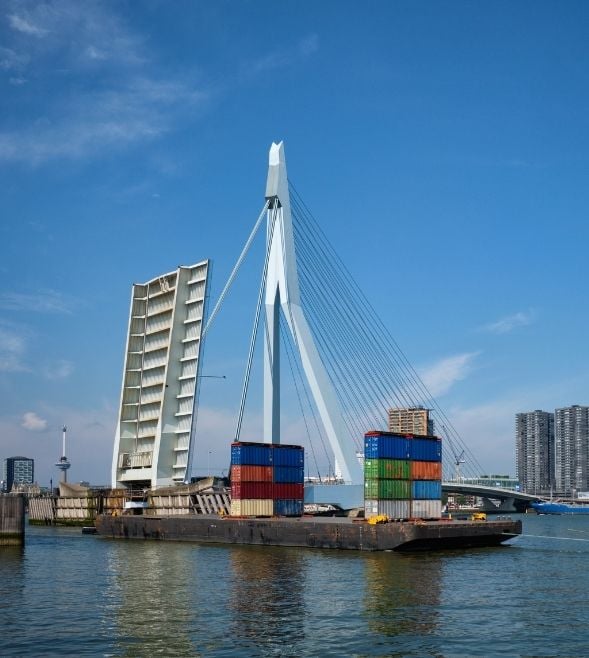-
Financial administration & outsourcing
Entrepreneurs who outsource financial administration reduce the number of administrative tasks and consequently have more time and space to focus on growth.
-
Financial insight
We help you turn financial data into valuable insights that support you in making well-founded decisions. In-depth analyses of your financial situation will help give you a better idea of where you stand and where the opportunities for growth lie, both in the short and long term.
-
Financial compliance
We make sure your company complies with financial legislation and regulations, with correct financial statements, tax reports and other obligations. From our global network, we support you in managing local and international tax risks.
-
Impact House by Grant Thornton
Building sustainability and social impact. That sounds good. But how do you go about it in the complex world of stakeholders, regulations and frameworks and changing demands from clients and society? How do you deal with important issues such as climate change and biodiversity loss?
-
Business risk services
Minimize risk, maximize predictability, and execution Good insights help you look further ahead and adapt faster. Whether you require outsourced or co-procured internal audit services and expertise to address a specific technology, cyber or regulatory challenge, we provide a turnkey and reliable solution.
-
Cyber risk services
What should I be doing first if my data has been kidnapped? Have I taken the right precautions for protecting my data or am I putting too much effort into just one of the risks? And how do I quickly detect intruders on my network? Good questions! We help you to answer these questions.
-
Deal advisory
What will the net proceeds be after the sale? How do I optimise the selling price of my business or the price of one of my business activities?
-
Forensic & integrity services
Do you require a fact finding investigation to help assess irregularities? Is it necessary to ascertain facts for litigation purposes?
-
Valuations
Independent and objective valuations tailored for mergers, acquisitions, and legal matters.
-
Auditing of annual accounts
You are answerable to others, such as shareholders and other stakeholders, with regard to your financial affairs. Financial information must therefore be reliable. What is more, you want to know how far you are progressing towards achieving your goals and what risks may apply.
-
IFRS services
Financial reporting in accordance with IFRS is a complex matter. Nowadays, an increasing number of international companies are becoming aware of the rules. But how do you apply them in practice?
-
ISAE & SOC Reporting
Our ISAE & SOC Reporting services provide independent and objective reports on the design, implementation and operational effectiveness of controls at service organizations.
-
International corporate tax
The Netherlands’ tax regime is highly dynamic. Rules and the administrative courts raise new challenges in fiscal considerations on a nearly daily basis, both nationally and internationally.
-
VAT advice
VAT is an exceptionally thorny issue, especially in major national and international activities. Filing cross-border returns, registering or making payments requires specialised knowledge. It is crucial to keep that knowledge up-to-date in order to respond to the dynamics of national and international legislation and regulation.
-
Customs
Importing/exporting goods to or from the European Union involves navigating complicated customs formalities. Failure to comply with these requirements usually results in delays. In addition, an excessively high rate of taxation or customs valuation for imports can cost you money.
-
Innovation & grants
Anyone who runs their own business sets themselves apart from the rest. Anyone who dares stick their neck out distinguishes themselves even more. That can be rather lucrative.
-
Tax technology
Driven by tax technology, we help you with your (most important) tax risks. Identify and manage your risks and become in control!
-
Transfer pricing
The increased attention for transfer pricing places greater demands on the internal organisation and on reporting.
-
Sustainable tax
In this rapidly changing world, it is increasingly important to consider environmental impact (in accordance with ESG), instead of limiting considerations to financial incentives. Multinational companies should review and potentially reconsider their tax strategy due to the constantly evolving social standards
-
Pillar Two
On 1 January 2024 the European Union will introduce a new tax law named “Pillar Two”. These new regulations will be applicable to groups with a turnover of more than EUR 750 million.
-
Cryptocurrency and digital assets
In the past decade, the utilization of blockchain and its adoption of a distributed ledger have proven their capacity to revolutionize the financial sector, inspiring numerous initiatives from businesses and entrepreneurs.
-
Streamlined Global Compliance
Large corporations with a presence in multiple jurisdictions face a number of compliance challenges. Not least of these are the varied and complex reporting and compliance requirements imposed by different countries. To overcome these challenges, Grant Thornton provides a solution to streamline the global compliance process by centralizing the delivery approach.
-
Private wealth services
Our Private Wealth specialists offer strategic and practical solutions. From tax advice to estate planning and financial scenarios, we make sure you make the right choices today, for tomorrow.
-
Corporate Law
From the general terms and conditions to the legal strategy, these matters need to be watertight. This provides assurance, and therefore peace of mind and room for growth. We will be pro-active and pragmatic in thinking along with you. We always like to look ahead and go the extra mile.
-
Employment Law
What obligations do you have with an employee on sick leave? How do you go about a reorganisation? As an entrepreneur, you want clear answers and practical solutions to your employment law questions. At Grant Thornton, we are there for you with clear advice, from contracts and terms of employment to complex matters such as dismissal or reorganisation.
-
Sustainable legal
At Grant Thornton, we help companies integrate sustainability into their business operations, with sustainable legal at the heart of our approach. We advise on ESG (Environmental, Social, Governance) legislation, and help draft sustainable contracts, implement HR policies, and carry out ESG due diligence in M&A transactions (Mergers and Acquisitions).
-
Pension advisory services
Are you, as business owner or employer, well prepared in terms of pension and other future facilities?
-
Global mobility services
How can you build and evolve a smart global mobility strategy, with policies and processes addressing the complex challenges of managing an international workforce?
-
Maritime sector
How can you continue to be a global leader? The Netherlands depends on innovation. It is our high-quality knowledge which leads the maritime sector to be of world class.

The European Commission’s VAT proposals can be divided into three main areas:
ViDA can be divided in the three main areas:
- Digital reporting (DRR) based on e-invoicing
- A single VAT registration: an extension of OSS
- New VAT rules for platform economy and e-commerce
Following our preceding articles, including our general article about ViDA, this last article in the series about the VIDA proposals gives an overview of the proposed changes in the area of the extension of the OSS and briefly comments on their impact on businesses. More details about other areas can be found by clicking on the relevant link above.
The single VAT registration – extension of OSS - measures apply from 1 July 2027 / 1 July 2028 and aim decreasing the need for multiple VAT registrations by expanding the OSS and the mandatory reverse charge. A broader range of goods could be reported through OSS, including the movement of a business’s own stock.
Extension of OSS to all types of B2C and to some B2B supplies
The OSS scheme currently provides a business selling goods B2C in other Member States (MSs) as well as a marketplace collecting VAT as the deemed supplier to fulfil their VAT compliance obligations via a single online portal. Several cross-border B2C services provided across the EU can also be reported via the OSS.
The OSS will be extended to supplies of gas, electricity, heating and cooling types of supplies from 1 July 2027.
From 1 July 2028, the scope of the OSS will be extended to cover all B2C services which are provided in the MSs where businesses are not established. The scope of the non-union OSS will cover all B2C services, and not only supplies of services to EU-established customers.
The scope of the Union OSS scheme will be expanded to cover domestic B2C supplies of goods by businesses who are not registered for VAT in the Member State (MS) of consumption.
New special scheme for transfers of own goods
From 2025, stock transfers could be reported in a Union OSS return. Businesses transferring stock between EU MSs could report those movement of own goods in their MS of identification. This would be the MS of establishment for EU businesses and the MS of departure of the goods for non-EU businesses.
Call-off stocks arrangements currently falling under EU simplification measure, could also be reported through the Union OSS return.
The EU call-off stock simplification will be phased out
Beyond 30 June 2028, no new transfers of stock under the EU call-off stock arrangements can be effected. For call-off stock arrangements commencing on or before 30 June 2028, the relevant conditions, including the 12-month time limit for transferring ownership of those goods to the intended purchaser, should continue to apply. The simplification will cease to apply with effect from 30 June 2029 since the simplification will no longer be required after that date, because those movements of goods can be reported via the Union OSS for transfers of own goods.
Extended domestic reverse charge
From 2025, the domestic reverse charge will apply for all B2B supplies of goods and services made by non-established and non-VAT-registered businesses if the recipient of the goods or the services is registered for VAT in the MS in which the VAT is due. It moves the burden of VAT payment to the buyer rather than the seller, meaning that the overseas seller does not need to register for VAT in the EU MS it is supplying to if the buyer is VAT registered in this MS.
Furthermore, MSs are allowed to apply the mandatory reverse charge to all situations where the supplier is not established in the MS where the supply takes place for VAT purposes.
Currently, the domestic reverse charge is an optional provision included in Article 194 of the EU VAT Directive. It applies to B2B sales where the supplier is not established in the MS in which the VAT is due.
In the Netherlands, the domestic reverse charge already applies to all local supplies of goods and services by non-established businesses if the recipient of the goods or receiver of the services is established in the Netherlands. If the EU proposal will be adopted, then this means that the scope of the reverse charge will be further extended to supplies to all VAT registered businesses. Furthermore, the ViDA package provides that the Netherlands could continue to apply the reverse charge to all supplies by non-established businesses not only if these businesses are not VAT registered in the Netherlands.
Suppliers need to report the transactions subject to the extended mandatory domestic reverse charge in the ESL from 1 July 2028, and in the EU DRR (e-invoicing and digital transaction-based reporting), from 1 July 2030. The acquirer of the goods or services also needs to report the purchases in the EU DRR from 1 July 2030.
Comments
These changes, i.e. the extended scope of the OSS, the special scheme for transfers of own goods and the extended scope of application of the domestic reverse charge, will reduce the VAT compliance costs for businesses and will therefore be expected to be welcomed by businesses. However, from 1 July 2030, the changes will be accompanied by increased obligations of (digital) reporting and e-invoicing which will generate costs for taxpayers; however the decreased fragmentation in the compliance requirements and complementary measures (e.g. the pre-filling of the VAT return and removal of other compliance obligations) can hopefully generate savings which would compensate for the new burdens.




